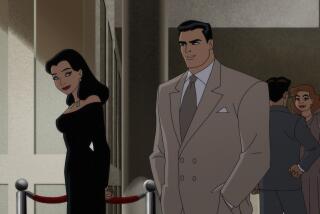Review: Why this TV critic loves ‘Wayne,’ a teen road series on YouTube Premium
- Share via
“Wayne,” whose 10 episodes premiered recently on YouTube Premium, is a comedy of opposites. Tender and violent, profane and thoughtful, simple and complicated, obvious and subtle, sweet and upsetting, an intermittently bloody hymn to goodness and innocence, and delicately acted even as it runs to extremes, it will not be everybody’s cup of tea.
Some may find it agreeable in parts. I loved it, mostly, but it seems allowable to fast-forward through the rougher passages, especially if you’re watching a lot of episodes at once — the violence, which is not poeticized, as is often the case in our fashionable modern entertainments, can be wearing, in both its physical and verbal varieties. (It is at times less a case of the dialogue being laced with expletives, than the expletives being laced with dialogue.) You might want to pace yourself.
Created by Shawn Simmons, who has written for kid, teen and grownup television over the course of a decade, the series centers on Wayne (Mark McKenna, “Sing Street”), a 15-year-old product of the bleaker quarters of Brockton, Mass. — a city of which Simmons himself is a native — with a father dying of cancer and a local reputation as a loose cannon. (He is a cannon, but not a loose one.)
Onto his front porch steps Del (Ciara Bravo, “Red Band Society”), who is selling cookies not explicitly identified as Girl Scout. Later they will be identified as stolen.
“So you got a boyfriend?” asks Wayne, who is as far as possible from having a girlfriend.
“Not really,” Del responds.
“Want me to be your boyfriend?”
“I don’t know. How tall are you?”
“Pretty tall.”
And thus begins a shy, slow-blooming romance, of a sort. (“Here’s the rules,” says Del. “I don’t like flowers, I don’t want a stupid valentine on Valentine’s, I don’t want to hold your fat sweaty hand all the time. And I’m never going to cook for you unless I’m making something for myself.”) At the end of the first episode, the pair head off by motorcycle in search of the 1979 gold Trans Am that carried his mother and her new boyfriend away to Florida when Wayne was 5 years old.
Wayne is a marvel of goodness; a sort of natural-born knight errant who, unlike Don Quixote, would have no idea what that is.
The series then becomes an extended road movie, with other teams in pursuit: an eccentric Brockton police sergeant named Geller (Stephen Kearin) and Officer Jay (James Earl); Wayne’s best and only friend, Orlando (Joshua J. Williams), in the unlikely company of their high school principal (Mike O’Malley); and Del’s angry father (Dean Winters) and her idiot twin brothers (Jon and Jamie Champagne), feuding like Tweedledum and Tweedledee.
It’s a quest tale constructed along classic lines, and as in peripatetic adventures from “The Odyssey” to “The Hobbit” to “The Wizard of Oz” to “Easy Rider,” the eccentric human creatures the runaways encounter on their way south can be welcoming or dangerous, helping or a hindrance. In some ways it has the feel of a YA novel, though one with a more than usual interest in adult characters, and more than a usual amount of action, in the punching and kicking and colliding sense.
Wayne is a marvel of goodness; a sort of natural-born knight errant who, unlike Don Quixote, would have no idea what that is, or thought of being one. He doesn’t understand irony; he doesn’t know how to lie, or even how to dodge a question. (“You’re like the … beacon of truth,” Del profanely says.)
Blessed or burdened with a keen (and one would say largely accurate) sense of right and wrong, he’s literally helpless to stand by in the face of what looks to him like injustice. A high tolerance for pain — which is not to say that he doesn’t feel it so much as that he doesn’t care that he does — makes him physically fearless, though he often gets the worst of it: “Boy,” says his father’s nurse as she patches him up, “it is getting hard to tell the new cuts and bruises from the old ones.”
It’s one of those shows, like “Lodge 49,” that seems to exist in the past and present at once; though there are sufficient indications the time is now — Officer Jay is an inveterate Instagrammer, and every so often someone uses, or attempts to use, a cellphone — it is essentially a pre-digital world. Some of this has to do with economics: Most of these characters can’t afford new stuff. But it’s also a narrative and aesthetic choice. Wayne plays death metal cassettes on an old boombox, reads Conan the Barbarian comics, has nunchaku and a lava lamp. The electronic accessories of modern life are an incoherent blur to him.
Simmons has said that Wayne came out after he started wondering what a teenage Dirty Harry might look like, but the series strikes me as being more in the vein of Hal Hartley’s first features — “Trust” and “The Unbelievable Truth” and “Simple Men” — stylistically heightened comedies of working-class characters too big or pure for their narrow, compromised worlds. (There’s a touch of “Rebel Without a Cause” in it, as well.)
That Wayne is a true hero and not an antihero, in spite of a tendency to solve things with his fists, or whatever heavy object may come to hand, is quickly evident, and regularly underscored. (“Wayne” does not want you to be confused about Wayne.) And where in many films or television shows, innocence such as Wayne’s would be his undoing, Simmons is not interested in making him a martyr — that would not only be a terrible cliché, it would violate the tenuously optimistic tenor of the show. It’s not an optimism that will pay off any time soon — Wayne will suffer more often than not, and this is not a limited series, but a potentially ongoing one. But when he’s happy, if just for an instant, the show lights up around him.
Follow Robert Lloyd on Twitter @LATimesTVLloyd
More to Read
The complete guide to home viewing
Get Screen Gab for everything about the TV shows and streaming movies everyone’s talking about.
You may occasionally receive promotional content from the Los Angeles Times.







